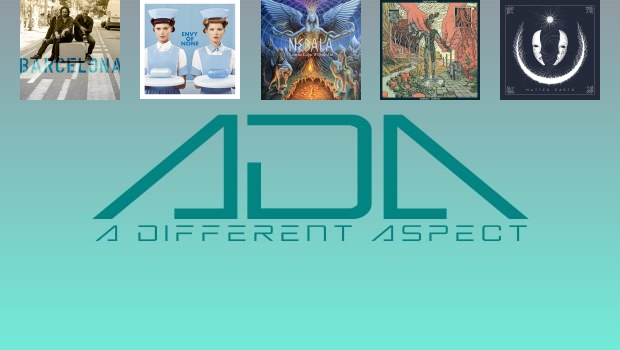Featured artists: No Answer Trio (Dusan Jevtovic, Vasil Hadzimanov, Asaf Sirkis) | Envy Of None | Nebala | Guranfoe | Sikasa ||:
In this ADA (shorter reviews) update TPA’s Nick Hudson looks at five recent albums featuring:
• No Answer Trio (Dusan Jevtovic, Vasil Hadzimanov, Asaf Sirkis) – Live In Barcelona
• Envy Of None – Envy Of None
• Nebala – Lustuz Laþu Wōþuz Alu
• Guranfoe – Gumbo Gumbo
• Sikasa – Matter Earth
– Live In Barcelona
Nick Hudson
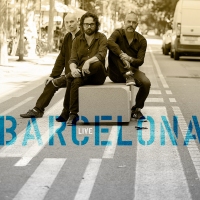
Live releases. Some people love them. Some people hate them. Count me as one of those who love them, so although No Answer was recorded live in the studio, and has already had a live performance released (cunningly titled No Answer Live), here is another live recording from the No Answer Trio. And it’s absolutely worth checking out, even if you are already familiar with its predecessors – and especially if you are not! The three musicians involved, Dusan Jevtovic (guitar), Vasil Hadzimanov (keys), and Asaf Sirkis (drums), are absolute masters of their craft, and the interplay between them is wonderful to listen to. Each knows when to play, and when to hold back, providing some incredibly dynamic and impactful passages. There is drama and tension galore, as well as blissful moments of calm. Even though, by the time this performance was recorded, the musicians will have played the pieces so many times already, they still sound fresh and new. It’s a joy to listen to, and it sounds like the trio find it just as much of a joy to play.
Jevtovic’s playing oscillates between smoother, more jazzy textures, and heavier tones that verge on metal. As I wrote in my review for his most recent studio album, If You See Me, Jevtovic’s playing is “sometimes gently inviting, and sometimes firmly gripping. At turns fragile, and feral”. At his incendiary best, I find him hard to top. At points throughout No Answer, and performances of material from it, I’m reminded of guitarists like Fripp, Hendrix, Beck, McLaughlin, Frusciante, Petrucci – and I think I would choose Jevtovic every time! The more I hear from Jevtovic, the more I feel he is entirely under-appreciated. But of course, this is not just Jevtovic’s show. Fellow Serb Vasil Hadzimanov is just as impressive on keyboards, and is well worth further investigation for those who have not. The pair released one of my favourite albums last year, Duo, and they definitely seem tuned into each other to an almost unbelievable degree.
Whether playing together or apart, Jevtovic and Hadzimanov always seem to be not so much a duo as two halves of a whole. But if Duo proved the pair don’t need a drummer to make incredible music, then that simply makes Asaf Sirkis’s presence the icing on the cake. And it’s damn fine icing. Sirkis is one of the best drummers out there at the moment, with a light, deft and jazzy touch but entirely capable of rocking out and creating a din. Four of the tracks played Live in Barcelona are from No Answer, and appeared also on No Answer Live, but you can definitely hear how the band have got under the skin of these pieces with such intuitive and impassioned interplay. Even at its most dissonant, the trio make it all sound so fluid and natural. The three remaining tracks make their recorded debut on this release. Basically, if you’ve not heard this trio play before, you need to listen to this album. And if you have heard them before, and enjoyed what you’ve heard (and really, how could you not?), then you still need to listen to this album.
Nick Hudson

Let’s face it, far too much emphasis was put on Alex Lifeson’s involvement in this album in the build up and its promotion. Or maybe I’m wrong. After all, Lifeson has some pretty mighty pulling power, so is an obvious selling point. But, to my ears, it’s a rather misleading one. Perhaps I’m too enamoured by the impressive vocal talent of Maiah Wynne. Perhaps I’m simply not well versed enough in Lifeson’s work to recognise his stylistic fingerprints. I have every Rush album, but I wouldn’t really call myself a fan – and much of the reason I have every album comes down to the fact I bought them as boxsets. I have Lifeson’s Victor album too, which I love. In fact, I like Victor more than any Rush album. Actually, I probably like Envy of None more than any Rush album too, but then my favourite Metallica album is Lulu with Lou Reed, and my favourite Dream Theater album is The Astonishing, so take my preferences with a pinch or two of salt. But when it comes down to it, this is an album that I find really very enjoyable. Is it prog? Is it progressive? Does Alex Lifeson even make that much of a noticeable contribution? That depends on the listener, I guess. Beauty is in the eye of the beholder, and all that…
I admit I had no real idea what Envy of None was going to sound like before I put it on. I had read talk about it sounding industrial, and seen comparisons made to Nine Inch Nails and Stabbing Westward. Given those two don’t sound alike at all, that wasn’t really elucidating. I guess I was at least expecting something with a little heaviness, so I was caught completely by surprise with opening track, Never Said I Love You. But it was a nice surprise, at it was (and remains, for me) remarkably reminiscent of Kiwi songstress Ladyhawke, whose music I like a lot. Industrial? Not at all, breezy and funky electronic pop. And while pop may be anathema to some, I’ve never been snobby in that regard. I love some well crafted pop, and this is very well crafted. But the surprise didn’t stop there. The following song couldn’t have had a more different feel to the opener, sounding almost like a collaboration between Ace of Base and The Cranberries. Again, that sort of description could put off more people than it attracts, but I don’t care. Shadow rocks! It’s simple, but highly effective. Just as effective is the way the album continues to shift in shape and form, track by track.
Look Inside is different again from either of the songs that preceded it, and is probably the heaviest and edgiest yet – but at the same time, the quietest and most subtle. See where the darkness lies? No, but I can definitely hear it, lurking in the layers of sounds here. Liar is back to the Ladyhawke, but with a Garbage tone to it. And, oh wait, maybe this is where the Stabbing Westward comparisons come from? Another cracking tune. And suddenly, Lifeson makes his presence more overt. Again, if you’re more of a fan than I, you may have noticed before now – but for me, Spy House is where I first really hear Lifeson’s presence. And, it sounds almost out of place after what has come before. Dog’s Life follows, and is as close as we come to those Nine Inch Nails comparisons, to my ears. But boy is it good, and entirely worthy of its position as centrepiece! Kabul Blues suffers by having to follow Dog’s Life, but it’s still a bloody great song. And so it goes on, until we reach the beautiful tribute to Neil Peart that concludes the album. As long as you’re open-minded and go on without too many expectations or preconceived notions, there is a LOT to enjoy here. I’ll definitely be happy to hear a follow up, should there be one.
Nick Hudson
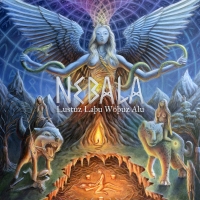
This album is almost indescribably amazing, which is not a particularly helpful attribute for the purposes of a review (though pretty damn fine when you’re listening to it). Nebala is the project of Danish musician Jonas Lorentzen, who is probably best known for his involvement with Heilung, and more recently The Northman, as songwriter and actor. And while Lustuz Laþu Wōþuz Alu‘s opener Alagabia reveals the combination of Nordic and Asian folk instrumentation and melody that pervades the album, it belies the eclecticism of style and sound that listeners will be taken through as the album progresses. While it might seem like a lot of instruments are used, including traditional frame drums, lyre, tagelharpa and Tibetan singing bowls, there are really only a few instruments overall, and this gives the album a minimalist and cohesive sound that is unsurprisingly haunting and moody, and more surprisingly intense and powerful. Along with the astounding variety of vocal variation, including throat singing, melodic chanting, and harsh vocals and screams that wouldn’t be out of place on a black metal album, there is so much going on that it is very hard to adequately convey quite how much Lorentzen has achieved with Nebala’s debut album.
It helps that the songs are all fairly lengthy (not that I ever noticed). All but two tracks are over six-minutes long, and the first lasts over ten. Now, this might indicate that the album may not be an easy one for some to get into, but it is absolutely worth it – especially as the album continues to become more experimental as it moves forward. There’s not a song I don’t love, and I could probably call them all favourites, so let’s say that the third track, Safijan, is my first particular favourite, with its wonderful percussion, and chanting from both male and female voices. The deep chanting and impassioned singing on the following Skinanārijaz are equally delightful and evocative. Again, the rhythm provided by the percussion and chanting is incredible. The vocals are a treat throughout the album, ranging from spiritual calm to raw and primal harshness. Skinanārijaz has a scream towards the end, before an energetic coda that has to be heard to understand how impactful it is. It’s a six-and-a-half minute song that seems to fly by. I can honestly say I never realised how long any of the songs are until I began writing this review, and assumed them all to be around the three or four minute mark, so much do they suck me in and sweep me away.
Laþu Is a great choice for a single, indicating very clearly that Nebala is more than the Nordic folk act that many might assume them to be, filled with the sounds of avant garde and dark ambient. Another particular favourite of mine, and completing a definite favourite sequence of three amazing tracks. Ant Mér Sjalfri Þér lulls the listener into a false sense of security with its introduction, before twisting and turning into a horrifying monster of a track that is genuinely scary and hair-raising. Mannz Gamana works wonderfully to calm the frayed nerves, full of space and atmosphere. It is an absolute achievement to have created so grand an album from so few sounds. Much of the album’s captivating power comes from percussion and vocals. The sense of the ancient and archaic, and of ritual and spiritual character, that they provide is simply incredible, and coupled with the avant garde experimentation, fresh, novel and original. Lustuz Laþu Wōþuz Alu is beautiful, monstrous, and alien. I love it!
Nick Hudson
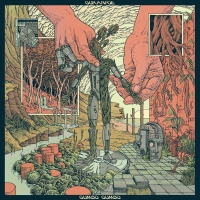
I loved Guranfoe’s debut album, so I was expecting to at the very least like this long-awaited second album. I admit a small niggle of doubt, though, based purely on the fact that this is an album clearly rooted in Guranfoe’s own past. The band began as Gumbo Variations, before changing their name to Guranfoe, and it is easy to see Gumbo Gumbo as being “Gumbo (Variations) 2”, as they revisit some of their oldest and earliest performed material. Indeed, you can easily find all of the five tracks that make up this album spread among many of the live recordings on Guranfoe’s Bandcamp page. The show at The Royal Standard, Lowestoft, on 15th December 2012 even has all five, performed in the same order they appear on Gumbo Gumbo. And that is as good a place as any to see how much the band has grown, and how far these new recordings leave the early performances behind. Not least, because Guranfoe have definitely grown into their own sound. As I suggested in my review of the Sum of Erda debut, a lot of their earlier live material was consummately played, but betrayed too much of their influences. It’s not a bad thing, and particularly if one enjoys those influences anyway, but Sum of Erda definitely sounded, to me, more like a band happy in its own skin, so I was wary about the band returning to their beginnings for the second album. I should not have been. This album sounds as gorgeous as its cover art looks.
What we get over these five revisited pieces are some technically brilliant interplay reminiscent of a collision between Zappa and Camel. A fusion of folk, jazz and Canterbury that is as psychedelic as it is prog, intensely melodic and easy to listen to, despite its many intricacies, chord changes and tempo variations. As per my review for the debut, while the guitar playing is an obvious focal point and guide, I can’t help but be entranced by the rhythm section, who hold it all in check, and virtually lead from the rear. As with their debut, the core quartet of Guranfoe is augmented by guest musicians, whose presence is judicious, and therefore impactful rather than intrusive. Too often a guest musician can be distracting to my ears, but this is certainly not the case with Guranfoe. My favourite guest musician on Sum of Erda was Rob Milne, who played flute and clarinet. He’s back again, this time providing flute and saxophone. I absolutely love his contributions.
Listening to the five tracks and comparing them to earlier recordings it is clear that they are not identical. Guranfoe have not simply re-recorded these numbers but added to them, and changed them to reflect how the band sounds now. There has always been a fine line between improvisation and composition to my ears, when it comes to Guranfoe, so its potentially misleading to suggest that new material has been written for these pieces, so much as the pieces themselves have evolved. Their origin is recognisable, but certain passages are not. So even those who might claim to know Guranfoe’s discography like the back of their hand (and that would be quite a feat, considering how many releases are available to listen to on Bandcamp) will find something new in these “old” tunes. Ultimately, I still find myself a little ambivalent about Gumbo Gumbo. I absolutely love it, but it’s not going to overtake Sum of Erda in my affections, and I kind of wish Guranfoe had followed up that album with something more along the same lines. On the other hand, it leaves me hanging out for album number three, and holding out hope that I might yet get my wish fulfilled.
Nick Hudson
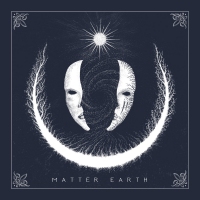
Sikasa began as a one man project, that man being Bruno Dugopoljac (here appearing under the alias of Bruno Longfield). Bruno is a singer and multi-instrumentalist from Croatia (playing, amongst others, trombone, guitar, drums and percussion), a member of, or guest musician for, various Croatian bands. Sikasa provides Bruno with the freedom to play whatever he wants and however he wants. Bruno was credited with playing “everything” on the debut EP, Karma, apart from some keyboard and saxophone parts, which were played by Toma Cukrov and Sven Mati-jević. Both these musicians are also present on this debut full-length Sikasa album, Matter Earth. The band is now no longer marketed as being a one man project – although it seems to me to be still largely the vision of Bruno. And what a vision! It takes all the potential of Karma, not only reaching the dizzy heights that release aimed for, but leaving them a pale blue dot light years behind.
Neither prog metal, nor post-metal, the sound of Sikasa almost defies categorising, and encompasses a great deal of variety over the course of the album. Matter Earth has a rich and full sound that is surprisingly melodic, even when it veers into its heaviest territories. I’m reminded of bands as disparate as Extreme, In Vein, Iron Maiden, Katatonia, Opeth, A Perfect Circle, White Ward, and Steven Wilson (both Porcupine Tree and solo). There is a soul, passion and depth to the music of Sikasa that is really quite enchanting. The eclectic nature of Sikasa’s sound is partly due to their fusion of differing cultures, languages, traditions and instrumentation. The album almost seems to build upon itself track after track, each more exciting than the one before. Opening track, Isola had already set the bar very high, but that doesn’t pose a problem for Sikasa, who provide a succession of quite inspired songs. Dynamic, atmospheric, occasionally eccentric, the album might be ostensibly metal, but flirts with ska, funk, jazz, folk and more.
As well as some intriguing and captivating choices in instruments and instrumentation, there are also some wonderfully orchestrated passages. Almost all of this is provided by Bruno Longfield, suggesting that despite any appearance to the contrary, Sikasa is still very much his baby. And this is without even addressing Bruno’s vocals, which are as versatile as you might expect, given everything else going on here. As well as the expected clean and harsh vocals, Bruno is a rather talented throat singer. All this leaves me slightly confused by the choice of lead single, as taken out of context it really gives no indication of the originality and experimentation in sound that can be found elsewhere on Matter Earth. There’s nothing wrong with Where Giants Walk, and it works wonderfully sandwiched between the two heavier songs The Edge of Event and Of Sulphur, but it does have more impact in this context. Removed from the songs either side, it seems a risky opening gambit. That small personal criticism aside, Matter Earth is truly an outstanding debut album that really ought to be attracting a lot more attention than I’ve seen for it.

